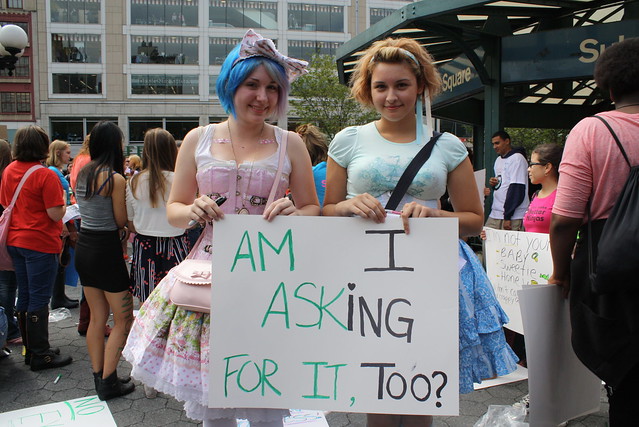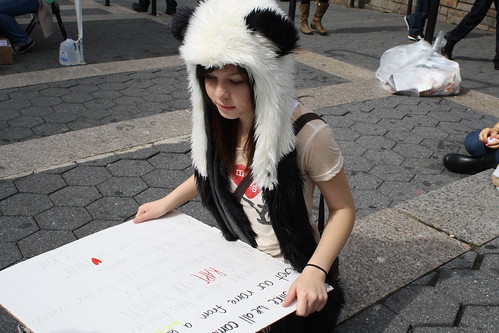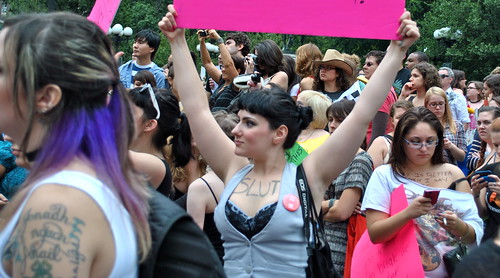Many people and most lolitas know the now-cliche Japanese saying: the nail that sticks up gets hammered down. Even though the proverb originated in Asia, it is clearly illustrated in almost all cultures and almost all countries. If you look different from the rest of those around you, you're a freak. You're not a person anymore. You're public property. You're there for the amusement of others, for them to take pictures or videos or scream insults at or question innocently or whatever they want to do with you, and if you rise against it, you're the one who's being inconsiderate.
Now, when you put on clothing that's out of the norm, a certain amount of attention is expected, maybe even welcome. Imagine if you lived in a world that was only made up of shades of grey, a world of white and black and slate, and then all of a sudden into your line of vision flashes a huge burst of pink. It's strange, it's new, it's weird- what would you do? Of course you'd do a double take. You'd probably stare, too, and if you were capable you'd probably go over and ask it questions, and whether you laughed or respected it would depend on who you are as a person. That's probably what it's like to see someone wearing alternative fashion, and that's why I'm not offended by second glances or repeated looks. It's okay, I'm weird- I don't expect you to take my existence lightly. I also know that it makes me stand out, and that standing out can be dangerous. However, from the average person walking down the street, I do expect respect, so when people take pictures or videos of me without my knowledge or tug on my curls to see if they're real or lift up my skirt to see what holds its shape (all of which have happened, and unfortunately most are not isolated incidents), I don't take it lightly. It is an affront to my person, to my physical and mental safety and well-being, and that is not something that I as a person deserve to have violated, no matter what clothing I choose.
Possible trigger warning ahead: discrimination, abuse, and rape are discussed past here.
Hopefully by now you see where I'm going with this. No person of any gender, race, class, age, sexual orientation or definition, or ability deserve to feel like their safety is threatened because of how they look, dress, or act. No matter how "safety" or "threatened" is defined, there is nothing about a person that means they do not deserve complete and utter respect.
Please note that I'm not putting being laughed at and being sexually assaulted on the same level. Bullying and rape are two very different occurrences, and they vary hugely in consequence. However, I believe that they are part of the same problem, that they stem from the same ideas of privilege, hatred, and negativity: because of how you look, an aggressor thinks they have the right to punish you for it. Rape is regarded as being more of an act of aggression against a societal construct that is focused on an unfortunate person (wrong place, wrong time, wrong clothing or demeanor), and I believe that often harassment over one's clothing or appearance often has the same basis: lashing out against something that bucks the status quo in a manner that offends the aggressor.
Please also note that I'm not saying that people get sexually assaulted because of their clothing; I've known plenty of people who were raped or molested or harassed wearing jeans. The clothing doesn't matter; in the cases I'm extrapolating on, however, the person's clothing choice was the catalyst for their harassment.
I have been sexually harassed in lolita, and so have many other people. Almost all lolitas (or at least, almost all the lolitas I know) have stories of people who tried to take pictures up their skirts, touch them inappropriately, proposition them or make unwanted sexual advances. It is assumed that because someone is wearing unusual clothing, they are doing it because they want attention, and some modern barbarian decides that it's their responsibility to teach that person a lesson, because god forbid someone likes to be looked at; or it is assumed that it is a sexual fetish and, since they're parading it around in front of everyone, they clearly deserve whatever some scum decides to give to them.
This is something that is faced by many people every single day, because of the society they live in: their neighborhood or their upbringing or any other number of things. Those of us with the privilege not to have to fight that at all times must recognize this; it is incredibly solacing to me that I can walk out of my house and take a train or go to the library or the movies and not have to constantly fear for my own safety. I am incredibly thankful for it, and I am thankful for the privilege it allows me to dress in ways that inadvertently happen to get attention without much threat to my own person. However, not everyone is this lucky. I think, first and foremost, that there is a certain amount of privilege inherent in people who wear alternative fashion, and that it's important right here and now to acknowledge that.
That being said, just like a person does not deserve to be molested simply because they are wearing revealing clothing, my friends and I deserve to be able to go out for a drink or dinner and not feel like our own safety is in jeopardy because we're wearing petticoats or top hats or ballerina heels. To me, it seems like this should be obvious, but to many people in the world, it isn't. And in the privileged society we live in, when we don't like something, what do we do?
In the words of my fellow marchers: What do you do when you're under attack?
Stand up. Fight back.
The time to sit passively and hope for change is over. It's such a cliche these days, but our ancestors fought hard so that we'd have the right to stand up for ourselves, and it is in their honor that we must rise against oppression in every sense, in every way, even this oppression which seem minute to anyone who's never had to face it. "Why don't you just change your clothes?" they ask.
"If the woman in the short skirt isn't asking for it, which she isn't," I respond, "Why am I?"
I'm not saying join a SlutWalk. I know there are a lot of inherent problems with this particular institution, and a lot of people are very, very opposed to them. However, when I decided to participate in SlutWalk NYC, I decided that the controversy surrounding it, while at times well-deserved, did not negate the positivity of its message in my mind. If you disagree, if the wrongs that are attributed to it overwhelm the rest of this movement, I'm not asking you to ignore that and march with a group you disagree with. However, I am saying that you should not sit passively back. Find a movement and join it. Do something to raise your voice because you have the right to and what's the point in having rights we don't use? What's the point in just complaining about the problems in the world if you're not actually doing something to fight it?
Or don't. Don't march, don't shout, don't kick up a fuss every time you're laughed at, stared at, screamed at. But if that's the course of action you choose, don't be upset when nothing changes. Our society is lazy and it likes the way things are: it'll only change with constant prodding and poking and forcing it to, and if you don't do it, who will?
Most pictures are from Pavement Pieces - I lost the source for the close-up of Remi and I, so if it's yours please let me know!





No comments:
Post a Comment